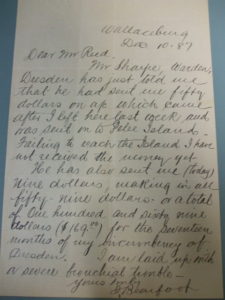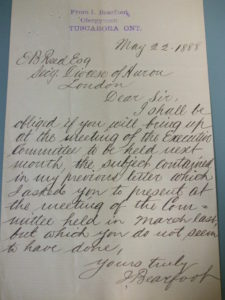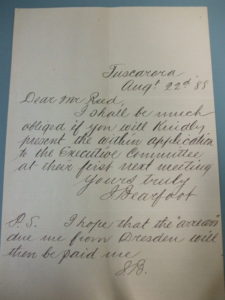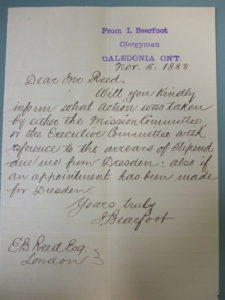In studying Isaac Bearfoot’s personnel file in the Diocese of Huron Archives, we are somewhat restricted by the very small amount of material available. Bearfoot’s file contains only a handful of letters and other documents, most of which relate to a single conversation regarding his lack of pay in 1887 and 1888. However, even this single series of letters can provide some insights into – or at least prod the historian to ask some specific questions about – Bearfoot’s experiences as a Haudenosaunee missionary in the latter part of the nineteenth century.
While other transcriptions present on this website demonstrate the severity of Bearfoot’s lack of pay, one of the most intriguing elements of the resultant series of letters actually has less to do with Bearfoot’s critical shortage of pay than with another related issue: Namely, the Diocese’s apparent lack of concern for Bearfoot’s situation. Three times across the four letters transcribed here – spread across a period just over half a year in length, between May and November of 1888 – Bearfoot requests that the recipient of these letters, the Diocese secretary E.B. Reed, look into, and then clarify, the situation regarding his attempt to get his arrears paid. Bearfoot’s repeated requests for action makes it quite clear that Bearfoot received no response to his repeated inquiries, as if his complaints were simply being brushed off by his superiors.
How likely is it that this might be the case? It is, of course, impossible to know for sure based on Bearfoot’s letters alone, but the possibility deserves consideration. Upon such consideration, the idea that this apparent neglect might be related to Bearfoot’s Indigenous identity emerges as a plausible explanation for this behavior. Throughout the nineteenth century Native catechists, missionaries and teachers were viewed as “the means… for carrying out the… object…” 1 of spreading “the truths of the gospel,” 2 and thus performed a critically important role in the missionary process. While one might assume that this would make the Native clergyman a respected member of the Church, the reality appears not to have been that simple. In dealing with the Nez Perce, the Presbyterian Church of the late nineteenth and early twentieth century marginalized Native clergymen, “refusing to treat them like other members of the clergy…” and even in 1937 expecting them to “live on… meager salaries.” 3 This example illustrates that the sort of marginalization being considered here certainly occurred within the clergy, and that it did manifest in poor pay. The comparison to Bearfoot’s obvious underpayment, and the Diocese’s apparent laxity in attempting to address their mistake, is clear.
This clear parallel is hardly positive proof of discrimination against Bearfoot over his race. The possibility that these letters are evidence of a degree of racially-motivated neglect of Bearfoot’s condition by the Diocese’s officials is a hard one to confirm, and any number of other factors might be involved in the lack of any apparent response from Mr. Reed. That said, however, the apparent amount of time that passed without any response to Bearfoot’s repeated inquiries leads one toward a suspicion, reinforced by the knowledge of such similar trends as the underpaying of the Nez Perce clergymen by the Presbyterians, that there may have been a racial element to the apparent carelessness with which Bearfoot’s complaints over his lack of pay were treated by the Diocese.
Letters from Isaac Bearfoot to E.B. Reed, 1887-1888
| Transcription #1:
Wallaceburg |
Document #1:
|
|
Transcription #2: [Stamp] May 22. 1888 |
Document #2:
|
| Transcription #3:
Tuscarora P.S. I hope that the “arrears” |
Document #3:
|
| Transcription #4:
[Stamp] E.B. Reed Esq: |
Document #4:
|
1. Edward Francis Wilson, An Account of the Opening of a New Mission to the Indians of the Diocese of Huron, Canada (Sarnia: The “Observer” Steam Job Press, 1869), 5.↩
2. Edward Francis Wilson, An Account of the Opening of a New Mission to the Indians of the Diocese of Huron, Canada (Sarnia: The “Observer” Steam Job Press, 1869), 4.↩
3. Bonnie Sue Lewis, Creating Christian Indians: Native Clergy in the Presbyterian Church (Norman: University of Oklahoma Press, 2003), 162.↩




